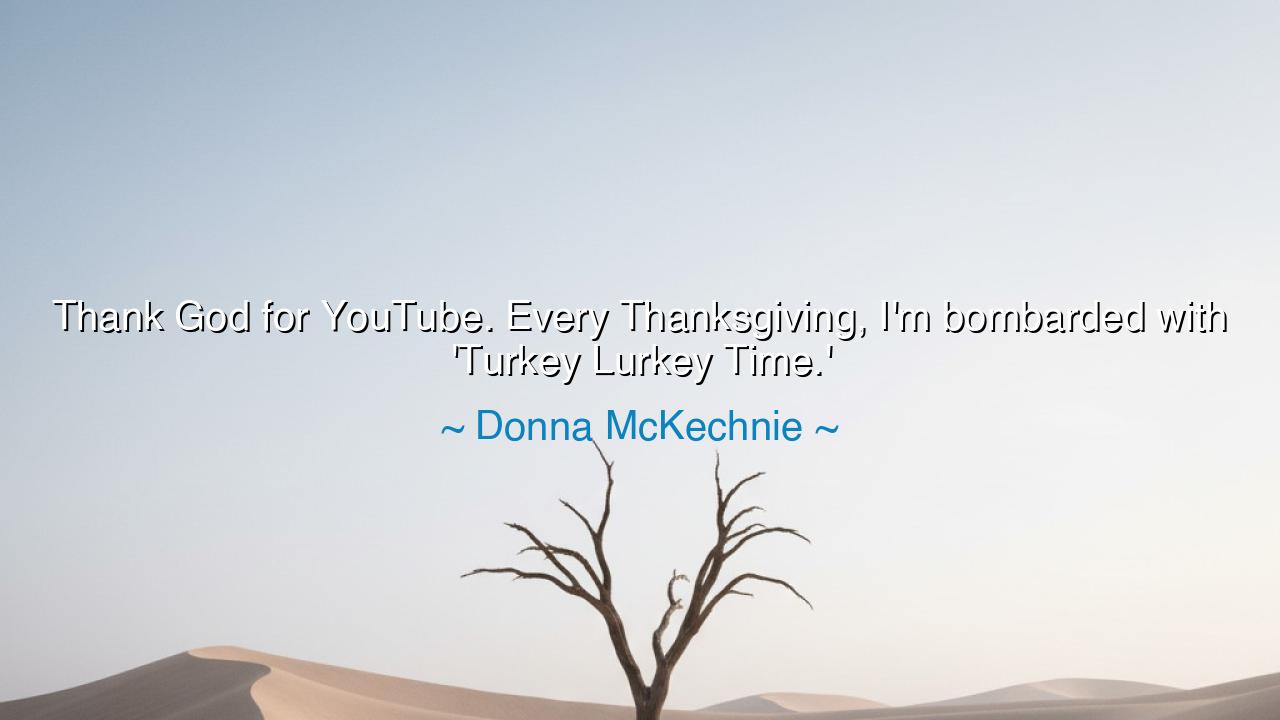
Thank God for YouTube. Every Thanksgiving, I'm bombarded with






In the playful yet telling words of Donna McKechnie, we are given a glimpse into the strange alchemy of memory, tradition, and fame: “Thank God for YouTube. Every Thanksgiving, I’m bombarded with ‘Turkey Lurkey Time.’” Though at first the remark seems light and humorous, beneath it lies a meditation on how art lives on in ways its creators could never fully imagine, and how the rituals of culture bind together the present and the past in unexpected ways.
The reference to YouTube is no accident. In the modern age, the stories, songs, and performances of old do not vanish when the curtain falls. Instead, they are captured, preserved, and reborn in digital halls where millions may stumble upon them. For McKechnie, famed for her work on Broadway, the song “Turkey Lurkey Time” has become an enduring echo, a performance that rises from the archive each year as surely as the smell of roasted turkey fills American homes. What was once a fleeting moment of performance has now been transformed into a ritualized memory, replayed again and again, until it becomes part of the very season itself.
There is humor in her words, but also a quiet weight. For while she is “bombarded” with the song, the bombardment is one of remembrance: the world does not let her forget who she has been, what she has given, and how her art has found its place in the rhythm of Thanksgiving. Here lies a truth: our creations, whether songs or stories, meals or traditions, often outlive the moment of their making. They become woven into the fabric of others’ lives, reappearing at seasons and milestones, long after we ourselves have moved on.
The ancients also knew this truth. Consider the hymns of Homer, first sung to living audiences, then passed down by memory, later inked onto scrolls, and now studied in universities centuries later. What was once a living performance around a fire became an immortal echo, shaping countless generations. So too with McKechnie’s song: the stage moment is long past, but the memory—revived yearly by technology and tradition—makes it live again.
There is also a subtle connection here between art and ritual. Thanksgiving, as a holiday, is marked by repetition: the same foods, the same gatherings, the same stories told. Into this cycle, McKechnie’s performance has been drawn, so that for many, “Turkey Lurkey Time” is not simply a number from a Broadway show, but part of the season’s tapestry. Just as hymns were once tied to sacred festivals, so now the cultural artifacts of modern life find themselves bound to new rituals of gratitude, laughter, and family.
The lesson for us is profound: what you create in life may outlast you in ways you cannot foresee. A song sung, a dish prepared, a tradition begun—these may return year after year in the hearts and lives of others. Do not think lightly of what you contribute to the world, for once released, it may become part of someone else’s rhythm of celebration, remembrance, or love. McKechnie’s legacy is not only in her artistry, but in how it has been woven into the season of gratitude for countless unseen lives.
Practical wisdom follows. If you are an artist, create boldly, knowing that your work may ripple into places and times you never expected. If you are not, then know that your smallest acts—whether a recipe you pass down, a story you tell, or a tradition you begin—can become a part of the cycles that others will cherish. And when you encounter the echoes of the past, whether through YouTube or memory, do not dismiss them as bombardment, but honor them as reminders of the enduring power of creation.
Thus, in the humorous words of Donna McKechnie, we find a timeless truth: that art, once given to the world, becomes part of life’s rituals. What was once a fleeting performance can become an annual tradition, a song that refuses to die because it has found its place in the feast of memory. Let us therefore live and create with care, knowing that what we offer to the world may be replayed again and again, carrying forward joy, laughter, and meaning long after the moment has passed.






AAdministratorAdministrator
Welcome, honored guests. Please leave a comment, we will respond soon